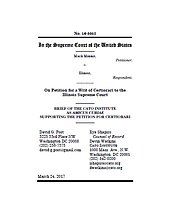Minnis v. Illinois
Learn more about Cato’s Amicus Briefs Program.
When Mark Minnis was 16 years old, he was convicted of having sex with a girl two years younger than him. As a condition of his adjudication as a juvenile, he was required to register with the state annually for 10 years. On a recent registration, he neglected to include his Facebook account (which he had included previously). Police then discovered that Minnis had updated his Facebook profile picture without informing the state. For this infraction, he faces up to five years in prison. Illinois recently started requiring that all sex offenders inform the government of all their internet identities, uniform resource locators (URLs) used, or websites where content is uploaded. Requiring disclosure of every URL means that the government knows the contents of every Google search, which runs into some potential constitutional problems. Nevertheless, the Illinois Supreme Court affirmed his conviction. Cato, with noted cyberspace-law scholar David Post, has now filed an amicus brief supporting Minnis’s petition asking the U.S. Supreme Court to review the case. Our brief focuses on the First Amendment. The purpose of this statute goes beyond just preventing crimes, as the state supreme court noted; one of its purposes is to enable the public to avoid all online interactions with post-release sex offenders, and it sweeps broadly in that regard. Yet this is a prohibited purpose under the First Amendment, which allows everyone to be a part of the marketplace of ideas. In addition, the court applied a lower level of judicial scrutiny than what is required for compelled disclosure of constitutionally protected speech. Compelled disclosure presents unique problems: the possibility of official retaliation or investigation can easily chill speech critical of government. The Founders understood these problems, which is why our country was founded by people speaking anonymously. The English government threatened anyone speaking out against the government, so anonymous publication became the only protection against harassment (see, for example, Thomas Paine’s Common Sense). Mr. Minnis only asks to do what Founding-era citizens did routinely: interact in the marketplace of ideas without having to submit all his speech to the government.



